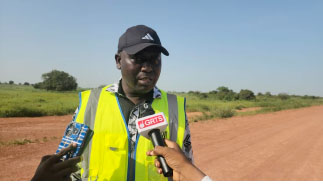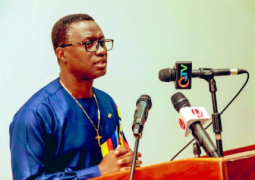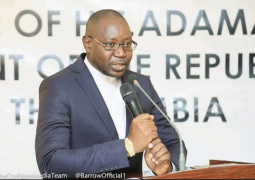
According to him, 2025 will be a turning point in terms of infrastructural development in the country as the government is earmarking to construct an additional 150 kilometre (km) of roads nationwide. The 100km of roads, he added, will be constructed in the rural Gambia while the remaining 50km will be constructed in the urban areas.
Minister Sillah was speaking to journalists on Monday during a site visit to Lot 2 projects that are made up of three roads: The Laminkoto-Banni-Youna to Kunting Road which is 12km; the Karantaba-Reneru-Tabanani-Demfaye Njaga to Litu Fulla which is 26km and from Njawo Loop up to Carol Wharf which is 12km of roads. The three roads, which are 50km, are currently being constructed by reputable Gambian owned company, Cornerstone.
Speaking further, he said: “The government of the Gambia is engaging the World Bank, and that the World Bank has already indicated that they are going to fund the 150km of roads in the rural area. In fact, we have already identified 150km of roads across the country.”
As part of efforts to bank these road projects, he added: “We have decided to say that we are going to do 570km of roads to be surveyed. We have already identified 570km of roads across the country that is going to be surveyed with the World Bank support. The survey is going to start very soon and we have already finalised the list and we are going to issue the list for tenders.”
“We are also talking to two strategic partners that have indicated their interest to support the government of The Gambia with an additional 500 km. We are now thinking ahead and by the time those partners come, we would have already been done with the feasibility study. We are hopeful about the future and that 2025 will be a promising year for The Gambia under the leadership of Barrow whose priority is infrastructural projects,” he postulated.
He underscored the government's commitment in modernising the country’s road network in their quest to connect communities through a good road network, thereby boosting economic activities, facilitating trades, enhancing access to health and education among others.
Road construction, bringing the much needed development to the doorsteps of Gambians, he went on, remains the top development agenda of President Barrow and his government. “No developed or developing nation can achieve socio-economic advancement in the absence of good road network.”
The overall essence of this project, Sillah stated, “is just not to build roads. However, it’s about boosting the country’s economic activities, enhancing livelihoods, connectivity and access to markets, education facilitates and bringing inter-connectivity between communities. Again, upon the completion of these roads, it will also boost trades between the neighbouring villages of Gambia and Senegal especially during the weekly markets,” he emphasised.
He hailed the contractor Cornerstone for what he described as the “tremendous job” they are doing in the area. “This is a clear indication that when Gambian companies are empowered, they will live up to expectations. Overall, I am happy with what they are doing in the area as over 30% of the work has been completed so far.”
Sulayman Sumareh Janneh, the deputy managing director of NRA reaffirmed his institution’s commitment in ensuring that all roads that are to be constructed in the country are up to standard,
“We work directly with the contractors and consultants and we assess the work that they do with the desire of ensuring that the roads that the government is constructing live to lifespan.”
“What we are doing right now is to ensure that any road bed being prepared meets the basic standard of structural integrity in order to ensure that when we build roads we have the basic longevity that is required.”
In terms of ensuring standard and longevity of road projects in the country, he said, “NRA is always reviving the construction in order to ensure that the contractors and consultants meet our basic standards. We have a team who is always on the ground in order to ensure that the contractors and consultants adhere to what is in the design documents. We inspect and ensure that our roads are maintained and also look at the drainage system.”
Commenting on the bridges around Njaw in CRR North, Janneh added: “Our recommendation is to ensure that those bridges are enhanced in order to make it more accommodating to the road structure and the proposed water flood that is expected in the area.”
Giving an overview of the roads project in the area, Jonas Agyemang, project manager of Cornerstone, reaffirmed the company’s key values of integrity and commitment and their uncompromising stance on standards.
“So far, we have already done the earthwork including the pavements. What we are left with is only the surfacing dressing which will be completed soon. We have mobilised the chippings for the surface dressings and we have also ordered for the bitumen. Anytime we get the bitumen, we will start the surface dressing,” Agyemang added.
The 40% of the work, he disclosed, has been completed with the Laminkoto-Kunting Road project, adding: “We have also finished the earthwork at the Renuru and Litu Fulla. What is left there is the concrete work and our team will finish with it in the next four weeks. So far, we have done what we are supposed to do.”
Read Other Articles In Headlines
Mayor Lowe accused of ousting finance director, bribing councillors with Cash
May 6, 2025, 10:38 AM




